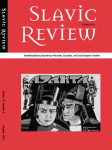
SLAVIC REVIEW
Scope & Guideline
Pioneering Research in the Heart of Slavic Studies.
Introduction
Aims and Scopes
- Interdisciplinary Research:
The journal encourages contributions that intersect various disciplines, including history, political science, sociology, cultural studies, and literature, fostering a comprehensive understanding of Slavic societies. - Historical Contextualization:
A strong focus on historical narratives and the evolution of political, social, and cultural dynamics in Slavic regions, providing context for contemporary issues. - Cultural Studies and Representation:
A commitment to exploring cultural texts, practices, and representations, examining how they shape national and ethnic identities within the Slavic context. - Post-Soviet Studies:
Analysis of the post-Soviet landscape, addressing themes such as nationalism, identity, memory, and the legacies of communism, reflecting on the transformations in Eastern Europe and Central Asia. - Current Affairs and Political Analysis:
The journal also engages with contemporary political issues, analyzing the impact of historical legacies on current governance, populism, and international relations.
Trending and Emerging
- Memory Studies and Trauma:
An increasing number of articles focus on memory, trauma, and the legacies of historical events, particularly in relation to the Holocaust, Stalinism, and the Soviet past, underscoring the importance of collective memory in shaping contemporary identities. - Environmental History and Ecological Concerns:
There is a growing interest in environmental history and the ecological dimensions of social change, reflecting a broader global discourse on climate change and sustainability, particularly in the context of post-Soviet regions. - Digital Humanities and Technology:
The integration of digital humanities methodologies is emerging, with scholars utilizing digital tools for research, analysis, and dissemination of Slavic studies, indicating a shift towards contemporary modes of scholarship. - Gender and Queer Studies:
Research exploring gender dynamics, feminist perspectives, and queer identities in Slavic contexts is on the rise, reflecting broader societal changes and the quest for inclusivity in academic discourse. - Transnational and Global Perspectives:
An increasing emphasis on transnational approaches that examine Slavic cultures within global contexts, exploring interactions and exchanges with non-Slavic societies, which broadens the scope of traditional studies.
Declining or Waning
- Classical Literature Analysis:
There has been a noticeable decline in papers focusing solely on classical literature without contemporary connections, indicating a shift towards more interdisciplinary approaches that relate literary analysis to cultural or political contexts. - Traditional Historiography:
Research that adheres strictly to traditional historiographical methods is becoming less prevalent, as scholars increasingly favor innovative and interdisciplinary frameworks that incorporate social sciences. - Ethnic Studies in Isolation:
Studies that examine ethnic identities in isolation, without considering broader socio-political dynamics, are seeing a decrease, as the trend moves towards integrative approaches that contextualize ethnic issues within larger national or transnational narratives.
Similar Journals
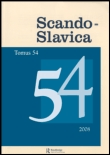
Scando-Slavica
Connecting Scholars: The Nexus of Scandinavia and Slavic StudiesScando-Slavica is a renowned academic journal published by ROUTLEDGE JOURNALS, TAYLOR & FRANCIS LTD, specializing in the rich interplay of Scandinavian and Slavic studies. With its ISSN 0080-6765 and E-ISSN 1600-082X, the journal has been a critical resource for scholars since its inception in 1954, covering a wide range of disciplines including archaeology, cultural studies, history, linguistics, and literature. As of 2023, it has consistently ranked in the third quartile across various categories, indicating its influential role in disseminating innovative research within the arts and humanities. With a focus on interdisciplinary dialogue, Scando-Slavica aims to foster a deeper understanding of cultural exchanges and linguistic connections, making it an essential read for researchers, professionals, and students interested in exploring the complexities of Nordic and Slavic interactions. While currently not an open access journal, its contributions have garnered substantial citations, bolstering its academic impact and relevance in a diverse scholarly landscape.
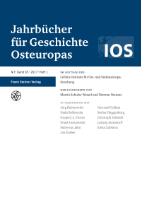
JAHRBUCHER FUR GESCHICHTE OSTEUROPAS
Bridging the Past and Present of Eastern European HistoriesJAHRBUCHER FUR GESCHICHTE OSTEUROPAS, published by FRANZ STEINER VERLAG GMBH, is a prominent academic journal dedicated to the exploration of Eastern European history. With its inception dating back to 1978, this journal has consistently provided a platform for scholarly discourse, contributing significantly to the understanding of the region's complex historical narratives. While the journal is not open access, it holds a solid reputation within the academic community, positioned in the Q4 quartile in history as per the 2023 category rankings, and stands at Rank #1636 within the Scopus Arts and Humanities History ranking. The convergence of its publication years throughout the decades emphasizes a long-standing commitment to historical research, thereby making it an essential resource for researchers, professionals, and students interested in Eastern European studies. Explore the intricate dynamics of historical events and cultural developments that shape Eastern Europe through this invaluable periodical.
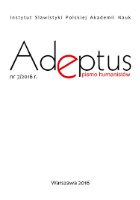
Adeptus
Fostering Innovative Scholarship in Slavic StudiesAdeptus is a pioneering open-access journal published by the Polish Academy of Sciences, Institute of Slavic Studies, specializing in Slavic studies and cultural research. Since its inception in 2014, the journal has aimed to foster scholarly dialogue and advance knowledge across various disciplines related to Slavic languages, literature, history, and sociology. With an ISSN of 2300-0783, Adeptus has positioned itself as a vital resource for researchers, professionals, and students engaged in Slavic studies, offering a platform for high-quality, peer-reviewed articles that explore diverse topics within the field. The journal's open-access model promotes accessibility and dissemination of knowledge, making it a significant contributor to the academic landscape. Located in Warsaw, Poland, Adeptus continues to thrive as a key outlet for innovative research, inviting submissions that embody rigorous scholarship and insightful perspectives.
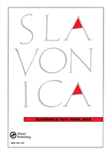
SLAVONICA
Illuminating Slavic Heritage Through Interdisciplinary InquirySLAVONICA is a distinguished academic journal dedicated to the exploration and analysis of Slavic studies, incorporating a wide array of cultural, historical, and linguistic perspectives. Published by Routledge Journals, Taylor & Francis Ltd, this journal serves as a critical platform for interdisciplinary scholarship, emphasizing the dynamic nature of Slavic cultures and languages. Though it currently does not offer Open Access, SLAVONICA is an important resource for researchers, professionals, and students seeking to engage with the latest academic discourse in the fields of Cultural Studies, History, Literature, and Linguistics, achieving a recognized place in the Q4 quartile across several categories as of 2023. With coverage spanning from 1994 to 2024, and its commitment to fostering academic inquiry, SLAVONICA plays a vital role in elevating the understanding of Slavic heritage and contemporary issues, making it essential reading for anyone interested in the complexities of this region.

Eastern Journal of European Studies
Illuminating the past and present of Europe through rigorous study.Eastern Journal of European Studies is a distinguished open-access platform published by UNIV ALEXANDRU IOAN CUZA, CENTRUL STUDII EUROPENE, dedicated to advancing research and scholarship in the fields of Economics, History, Political Science, and Sociology. Since its inception in 2010, this journal has been committed to fostering a rich dialogue among scholars and practitioners, emphasizing interdisciplinary approaches to European studies. With a notable Q1 ranking in History and Q3 rankings in other social sciences categories as of 2023, the journal holds a strong position in both European and global research landscapes. As part of the Scopus indexing, it stands out with impressive percentiles, including the 90th percentile in History. By providing an open-access platform, the journal ensures that critical research is widely accessible, bridging gaps between academia and the public. It serves as an essential resource for researchers, policymakers, and students interested in exploring Europe’s complex dynamics, making significant contributions to contemporary debates and policy implications.

Acta Baltico-Slavica
Connecting Scholars Across Baltic and Slavic DisciplinesActa Baltico-Slavica, an esteemed academic journal published by the Polish Academy of Sciences, Institute of Slavic Studies, serves as a vital platform for the exploration of Slavic cultures, languages, and historical narratives. Since its transition to Open Access in 2014, the journal has fostered inclusivity and accessibility, allowing researchers, professionals, and students to engage with cutting-edge scholarship in the fields of History, Linguistics and Language, and Literature and Literary Theory. With a commendable impact as indicated by its category quartile rankings (Q2 in History and Literature, Q3 in Linguistics), and Scopus rankings reflecting its significance within the academic community, Acta Baltico-Slavica not only contributes to the rich tapestry of scholarship surrounding the Baltic and Slavic regions but also encourages interdisciplinary dialogue. The journal’s commitment to advancing knowledge across its fields of study makes it a prominent destination for scholarly discourse and research inquiry.

ZEITSCHRIFT FUR SLAVISCHE PHILOLOGIE
Advancing Understanding in Slavonic PhilologyZEITSCHRIFT FUR SLAVISCHE PHILOLOGIE is a pivotal journal in the field of Slavonic philology, published by Universitatsverlag C Winter Heidelberg GmbH. Renowned for its scholarly rigor and insightful contributions, this journal serves as a key platform for researchers, professionals, and students interested in Slavic languages and linguistics. Despite its classification as a traditional subscription journal, it has maintained a consistent presence in the academic community with contributions that enhance understanding of linguistic, cultural, and literary studies within the Slavic context. With an H-index reflecting its impact and relevance, the journal has historically been indexed in Scopus, ranking in the 34th and 33rd percentiles within the Arts and Humanities and Social Sciences categories, respectively. The journal has featured a range of scholarly articles from 2002 to 2017, providing a rich repository of knowledge for those dedicated to the study of Slavic languages. For any researcher aiming to delve into this dynamic field, ZEITSCHRIFT FUR SLAVISCHE PHILOLOGIE remains an essential resource.

SLAVIC AND EAST EUROPEAN JOURNAL
Illuminating the Diversity of Eastern European NarrativesThe Slavic and East European Journal (ISSN: 0037-6752) is a distinguished publication focused on the rich tapestry of Slavic and Eastern European cultures, languages, and literatures. Published by the Ohio State University’s Department of Slavic and East European Languages & Culture, this journal serves as a vital platform for scholars and researchers keen on exploring linguistic diversity and cultural heritage in these regions. With a wide-ranging scope, the journal addresses significant topics within Cultural Studies, Linguistics, and Literature, currently categorized in Q4 and Q3 quartiles across various academic metrics. Although it does not offer open access, anticipation is high among academics seeking to contribute or access cutting-edge research that pushes the boundaries of understanding these complex fields. As it converges from 2009 to 2024, the Slavic and East European Journal continues to uphold its commitment to academic excellence and community engagement, making it an essential resource for anyone dedicated to the study of Slavic and Eastern European traditions.

Konstantinove Listy-Constantines Letters
Exploring the intersections of thought and tradition.Konstantinove Listy - Constantines Letters is a premier academic journal published by the Constantine Philosopher University in Nitra, Slovakia. With a focus on the interdisciplinary exploration of historical, philosophical, and religious studies, this journal has established itself as a significant platform for scholarly discourse since its inception in 2015. The journal's impressive rankings—Q1 in History and Religious Studies, along with Q2 in Philosophy—demonstrate its commitment to high-quality research, concurrent with its strong performance in Scopus rankings, placing it in the 80th percentile for both Religious Studies and History disciplines. As an integral part of the academic landscape, Konstantinove Listy invites researchers, professionals, and students alike to contribute to its mission of advancing knowledge and understanding in these vital fields. While the journal operates under traditional publishing, it is recognized for its accessibility and contribution to fostering a vibrant scholarly community.

European Journal of Transformation Studies
Transforming Insights, Shaping FuturesThe European Journal of Transformation Studies is a distinguished peer-reviewed publication focusing on the multifaceted field of transformative processes across Europe and beyond. Published by EUROPE OUR HOUSE in Tbilisi, Georgia, this journal serves as a vital platform for researchers, academics, and professionals to share insights into socio-economic, cultural, and technological transformations in contemporary societies. Although the journal operates under an open-access model, ensuring wider dissemination of knowledge, it aims to cultivate a rich discourse around transformation studies by presenting innovative research, theoretical advancements, and case studies that reflect the evolving landscape of Europe. With its commitment to advancing understanding in this critical field, the European Journal of Transformation Studies is poised to become an essential resource for scholars and practitioners alike, encouraging interdisciplinary collaboration and fostering new perspectives on transformation.